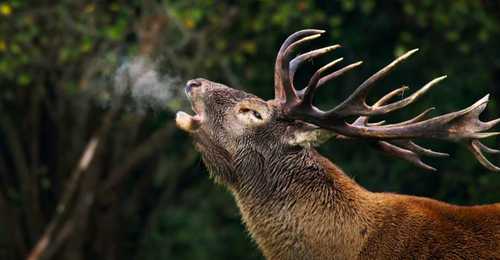
In the bestselling Wilding: The Return of Nature to a British Farm (2019), author Isabella Tree described the creation of Knepp Wildland, which saw 3,500 acres (1,400 hectares) of ancestral farmland owned by her husband, Charles Burrell, being returned to a state of wildness. Now, this story – of the first extensive rewilding project in lowland England – has become a documentary, currently on general release in the UK.
It follows the nearly 25-year process that has led to the site becoming a rewilding success story. Since 2001, chemical intervention has ceased on the Wildland, while free-roaming species of deer, ponies, pigs, and cows have been introduced on the site, with the latter three standing in for the aurochs, tarpan, and wild boar historically present in Britain.
This is not to suggest that the decision to cede control to nature was universally welcomed. In one of Wilding’s (admittedly, slightly clunky) reenactments, we see the plan go down like a lead balloon when presented to neighbors, while a selection of negative comments from poison pen letters and caustic editorials act as an unwelcome but necessary reminder that, outside of sites like Earth.fm, many people are mistrustful of nature being given a free hand.

As it is, the project has seen an astonishing explosion of plants and wildlife, including embattled species like turtle doves, nightingales, black storks, barbastelle bats, slowworms, barred grass snakes, purple emperor butterflies, and the vagrant emperor dragonfly. Other inhabitants include the first beavers living wild in the county of Sussex for 400 years, and the first white stork chicks born in the wild in England for more than 600 years.
The film prioritizes these success stories over any concerted investigation of the science behind the recovery of the land from decades of industrial farming, or the glaring question of how, exactly, the estate continues to be profitable. But, even though detractors could characterize it as green propaganda (no shame in that), Wilding is successful as an aspirational document of the extent to which the natural world can reassert itself when given half a chance. Footage contrasting Knepp’s verdantly overgrown present with its more manicured past is not only gorgeous, but a reminder of how managed the English countryside is.
… a worthwhile (if temporary) escape from environment-related doom and gloom – and, hopefully, a source of inspiration.
It’s fair to say that tolerance for a film given over to an aristocratic couple who live in a literal castle will vary (Tree is the adoptive granddaughter of the 10th Duke of Devonshire; Sir Charles Burrell is a baronet). Fortunately, Tree is an engaging presence, and since the family’s swerve away from conventional farming came about due to its unprofitability and accumulating debt means the Wildland doesn’t smack of landed gentry vanity project.
Overall, Wilding is a worthwhile (if temporary) escape from environment-related doom and gloom – and, hopefully, a source of inspiration. Of course, most of us don’t have thousands of acres to devote to such a project, but we hope that seeing what can come from allowing wildlife the conditions in which it can thrive – whether that means a window box or a collection of bird feeders – will inspire its viewers.
Earth.fm is a completely free streaming service of 1000+ nature sounds from around the world, offering natural soundscapes and guided meditations for people who wish to listen to nature, relax, and become more connected. Launched in 2022, Earth.fm is a non-profit and a 1% for the Planet Environmental Partner.
Check out our recordings of nature ambience from sound recordists and artists spanning the globe, our thematic playlists of immersive soundscapes and our Wind Is the Original Radio podcast.
You can join the Earth.fm family by signing up for our newsletter of weekly inspiration for your precious ears, or become a member to enjoy the extra Earth.fm features and goodies and support us on our mission.
Subscription fees contribute to growing our library of authentic nature sounds, research into topics like noise pollution and the connection between nature and mental wellbeing, as well as funding grants that support emerging nature sound recordists from underprivileged communities.

